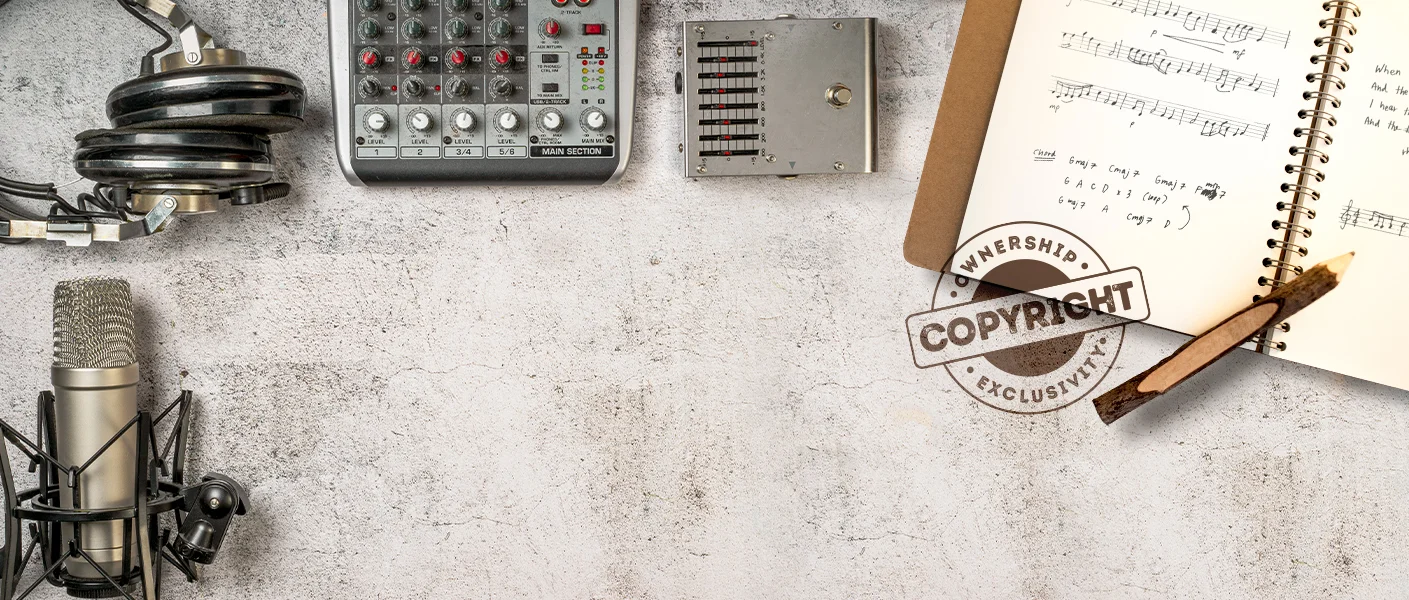A complete guide on song copyright for songwriters
March 5, 2021 By Dinesh ParmarCreation of a song involves months of efforts on the part of various artists, making it essential to protect it with copyright law to ensure that nobody other than its original creators enjoys the benefits from it. Since a song is usually a combined effort of various artists, its ownership doesn’t belong to any one person. A song contains several elements that can be protected in parts. All the involved creators of the song i.e. the lyricist, singer, composer and producer can collectively draft a document determining the splits and copyright their respective parts in it.The Copyright Law allows protection of its parts by different people as well as a copyright of the song as a whole.
If you record a song yourself, by paying for studio time and session fees, you own the sound recording. If you work with a label, there is a possibility that the label controls the copyright to the recording. At times a song may also be wholly owned by only one person if he writes the song, gives music to it and sings it.
Registering a song copyright gives the holder exclusive rights to:
- Perform the song
- Produce it in public
- Translate the song
- Use it for a cinematographic film or recording
- Reproduce the song or make adaptations of it
- Make copies & distribute the song
- Allow edits of copyright song lyrics
- Make derivatives of the song
- Exploit it monetarily
- License it and receive royalties for remakes
- Publish the song
- Broadcast the song
- Prevent others from unauthorized usage of the sound.
There are two types of copyright for music:
The composition which covers the music & lyrics and is usually owned by songwriters and/or publishers. The sound recording, which is a particular recorded version of that music & lyrics is often owned by artists or labels.
The validity of a song copyright and other musical work exists for sixty years from the date of its publication/recording/performance or for the lifetime of the author plus sixty years from the date of death. Currently, much like other artistic work, there is no renewal procedure for copyrights of songs under the India law.
The ‘poor man’s copyright’ is a valid method of proving copyright wherein a musician sends a copy of the composition or recording to themselves via mail, leaving the package sealed with the date clearly marked. Although valid, this method is not reliable or recommended because while it proves ownership, it does not award the rights of a registration.
But how can you copyright a song?
The registration process for the copyright of a song in India follows a similar pattern to other copyright registrations in India.
Step-1 Filing the application
A copyright registration application can be filed through a copyright attorney or through the online portal. The application should include all important descriptions as well as details of the lyricist, singer, composer and producer. If a single owner is filing for copyrights, it is mandatory to attach a NOC form the other owners notifying that they are aware of his application and his attempt to copyright lyrics or protect his specific part of the song. Once a fee is submitted along with the application, a diary number will be issued.
Step -2 Formality check
The examination process begins with a formality check by the copyrights department. This process verifies the basic requirements of 2 copies of work and the complete FORM-XIV along with completion of power of attorney formalities. If the application fails on formality check, the applicant will be notified and provided with adequate time to edit & rework his application.
Step-3 Waiting Period
Once the application is cleared, it will be published/announced to the general public to check for objections from people with any interest in the subject matter. After a wait of 30days, if no objections are received, the application will move forward.
Step-4 Hearing
In case an objection is received on the copyright application, a notifying letter will be issued to both the parties and they will be given a chance to present their sides in front of the registrar on a pre-scheduled date. If the hearing rules in favor of the applicant and if no other objections or delaying obligations are found, the application will be passed on to the copyright examinations department.
Step-5 Registration Granted
Once all levels of examinations are cleared and approved, the registrar will grant the approval and send an extract of it to the applicant. The registration is considered complete once the Registrar issues a signed copy of the entry of the copyright in his Register. Once this step is complete, the songwriter/(s) can enjoy the advantages of their copyright registration. Only after this point can they legally license their song for remakes or performances, claim copyright over lyrics or receive royalties for the same.
A copyright lawyer can help you navigate through the complicated procedures involved with protecting songs and musical artworks.
We understand that new technologies have significantly increased the speed of distribution and altered the boundaries of copyright law. With the click of a mouse, a musical piece can be transmitted around the world within seconds, and a copyrighted song can be posted on a website for millions to listen, perform, and reproduce according to their will. At Parker & Parker, we assist our clients with registering music copyrights, expediting applications, recording documents and proceedings in all phases of litigation should the need arise in cases of copyright infringements.





